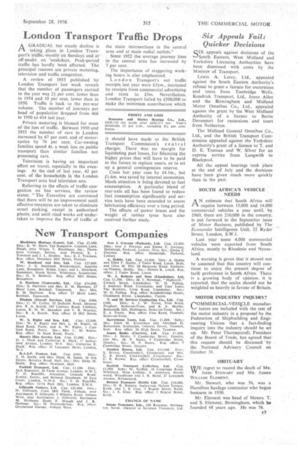London Transport Traffic Drops Six Appeals Fail: A GRADUAL but steady
Page 69

If you've noticed an error in this article please click here to report it so we can fix it.
decline is taking place in London Transport's traffic,-mostly on Sundays and at off-peaks on 'weekdays. Peak-period traffic has hardly been affected. The principal reasons are private motoring, television and traffic congestion..
A review of 1955 published by London Transport last week reveals that the number of passengers carried in the year was 2-15 per cent, lower than in 1954 and to per cent. lower than in 1950. Traffic is back to the pre-war volume. The number of journeys per head of population dropped from 466 in .1950 to 414 last year.
Private motoring is blamed for most of the loss of traffic. Between 1950 and 1955 the number of cars in London increased by 67 per cent, and of motorcycles by 76 per cent. Car-owning families spend 4s. a week less on public transport than similar families not possessing cars.
Television is having an important effect on travel, especially in the evenings. At the end of last year, 42 per cent. of the households in the London Transport area had television sets.
Referring to the effects of traffic congestion on bus services, the review states: "The Executive are convinced that there will be no improvement until effective measures are taken to eliminate street parking, except in authorized places, and until road works ard undertaken to improve the flow of traffic at the main intersections in the central area and at main radial outlets."
Since 1952 the average journey time in the central area has increased by 7 per cent,
The importance of staggering working hours is also emphasized.
London Transport's net traffic receipts last year were £31m., increased by receipts from commercial advertising and rents to £5m. Nevertheless, London Transport failed by £500,000 to make the minimum contribution which it should have made to the British Transport Commission's central charges. There was no margin for liquidating past losses, for financing the higher prices that will have to be paid in the future to replace assets, or to set up a general contingencies reserve.
Costs last year rose by £4.1m., but £1.6m. was saved by internal economies. Much attention is being devoted to fuel consumption. A particular .blend of rearaxle oil has been found to reduce fuel consumption significantly and service tests have been extended to assess lubricating efficiency over a long period.
The effects of power losses and the weight of rubber tyres have also received further study.




































































































































































